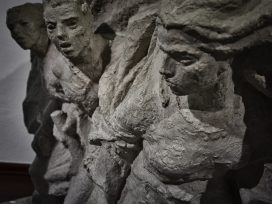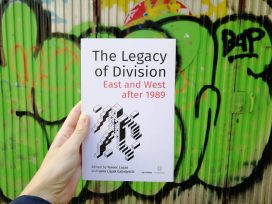The first meeting of this Eurozine conference took place in Café Neringa on 7 May. I found this quite symbolic. Lithuanians commemorate the date as the “Day of the regained press, language and book”, when the ban on printing the Lithuanian language in Latin script was lifted after an uprising against the Russian tsar in 1863. For forty years, Lithuanian books were printed in East Prussia and smuggled into Lithuania like contraband by dedicated “book carriers”. Some were motivated by profit, of course. Yet many were killed crossing the border or deported to Siberia. The aim of the prohibition was to replace Polish with Russian cultural influence among the local population. The ban was unsuccessful and sometimes had the reverse effect. Lithuania was under the influence of the Catholic Church and the prohibition merely encouraged the Church to use the Lithuanian language to an even greater extent during services. A large part of the Lithuanian peasantry felt it to be their obligation to buy and read these books. The prohibition, though having stopped the spread of Lithuanian literature for a time, thus raised a great wave of linguistic resistance, which by 1918 turned a country of peasants into the independent Republic of Lithuania. I think this is an important episode in the history of this particular country and in European history generally, not only because it is very much related to press and publishing, but also because it strongly echoes in our days.
It is not surprising that such historical circumstances endowed Lithuanians with a special attitude towards their language and its written literature. I would like to remind you that the Lithuanian language belongs to the Baltic branch of the Indo-European language family. Closest to it are Latvian and the now-extinct “Old” Prussian language, which remains only in a reconstructed dictionary. The structure of the Baltic languages, with their case endings for words, is closer to the Slavic language group, Latin and ancient Greek than it is to the prepositional Germanic, Anglo-Saxon or romance languages. The first book in the Lithuanian language, Martynas Mazvydas’ Catechism, was published in what was later called East Prussia in 1547, at around the time that many books were being published for the first time in vernacular languages in the region. Lithuanian literature began to spread more widely only at the end of the eighteenth century, when the Protestant East Prussian pastor Kristijonas Donelaitis wrote his aesthetically mature masterpiece Metai (The Seasons) in hexameters. However the language we speak in Lithuania today was standardized only at the beginning of the twentieth century.
Language was and remains a fundamental spiritual value, defining and protecting a culture’s specific national qualities. Such an attitude was unwittingly affirmed by the Soviet regime, whose efforts to change the society’s mentality had the opposite effect, just as during the times of the prohibition of the Lithuanian alphabet. We can therefore say that Lithuanians reached the end of the twentieth century without having forgotten the romantic ideals of the Spring of Nations. And that was natural: for us, the Second World War ended de facto with the partisan war in 1954 and de jure on 11 March 1990.
So, the year 1989 caught us by the window, the blinds suddenly opened, staring at the strange view outside and trying to define it from the perspective of our own historical experience. Though the culture and values conveyed by the curricula of our education system were not very different from those on the other side of the Iron Curtain, our mentality was different enough. The last twenty years is a history of changes to this mentality. What they are? In his opening speech, Antonin Liehm mentioned that despite there being forty different national cultures in Europe, a certain common identity exists. I think this identity is based on a special European mentality that ignores manifest North-South, East-West differences and all the curtains that have divided Europeans throughout history. It can be described as a creative, reflective, rational, free, tolerant, critical, somewhat ironic relationship to the self and to the world.
What features were we Lithuanians lacking in 1989? It seems to me that we were a bit less free, less tolerant, less self-critical and ironic towards ourselves, maybe even less rational, more susceptible to all kinds of mythologies. In times of censorship, we thought that our vague messages, our witty metaphors could be translated and understood by our audience. It was not the case: our communication was not adequate. From the first attempt at free discussion, we noticed that our society was just not used to communicating on a rational basis. An irrational distrust of the state and its institutions was genetically typical to the majority of our society, and became a useful instrument for all kinds of manipulation. Politicians, especially those who graduated from Soviet propaganda schools, noticed the fact immediately. We did not even realize the moment when the allusive, aesopic public discourse so familiar to our audience switched to the allusive, aesopic discourse of political PR companies.
The last twenty years are therefore marked by attempts to rationalize our public discussions. The cultural press plays a significant role in this process. It behaved, I would say, as humanly as possible during times of occupation, and it was first to make use of the privileges of free speech. Antonin Liehm mentioned that the Czechoslovak paper Litéraní noviny had a print run of up to 2 million in the late 1960s. The weekly that I edit, Literatura ir menas (Literature and Art), had a print run of 70 thousand copies in 1989, which compares satisfactorily in relation to the population of Lithuania. These high print runs are easily explained: our societies were yearning for truth, knowledge, the free word, for things we discussed in our kitchens but not in public. But we have to remember that this situation was created by pro-Soviet regimes, by censorship. They built dams that were broken in such an impressive way. Our societies were imprisoned in something comparable to concentration camps, with milder or more severe regimes. People could not express themselves, could not do business, travel abroad, or even enjoy the stupid entertainments of mass culture. Their only option was to consume local cultural products – which were sometimes not bad – or to drink alcohol. And cultural products had an extensive reception. Even hardly digestible reading such as poetry collections appeared in print runs ten times the size of today’s, and had the authorities permitted the printing of more copies, they would have been bigger still.
Poetry always has a greater meaning for societies in uncertain historic circumstances. It has to do with complexes of feelings, ideals, forbidden zones of social memory and thought. Sometimes, metaphoric poetic language is the only way to speak about history, philosophy and religion. I am far from asserting that these things are the essence of poetry, but they bring to poetry many additional readers. In Lithuania, poetry was encouraged in this way for at least seventy years in the twentieth century. That is why I’m talking so much about censorship.
The Soviet regime was more severe than in states to the west of us (with the possible exception of Romania). We were living in the same political situation as the eastern European romanticists of the nineteenth century: occupation and censorship, collaborators and resistors. Our poetry had this additional meaning, this additional burden, though it was not Romantic in style. In the 1950s, 1960s and 1970s our poets were fighting for freedom of poetic form, not for freedom of speech. Fighters for freedom of speech and human rights were immediately sent to prison or psychiatric hospitals. However, the situation of censorship was changing and the regime was getting milder, unless thaws sometimes were reversed by temporal frosts.
The system of censorship was quite sophisticated. It had at least three levels. The first one was the copy-editors of magazines and publishing houses, friends and colleagues with whom you discussed literature quite openly. They said: please, change this or that section or remove this poem because the editors-in-chief or their deputies – censors at the second level – will not accept it. Sometimes, when you broke through the level of copy-editors, you were stopped at this second level. Yet it was not the worst that could happen. In the first post-war decade, if you were stopped by the official censorship office, Glavlit, you would be arrested; later, it meant that you would never publish anything anywhere in the zone again. So, the first two levels were protecting you from the third in some sense. Not only Nazis liked to do things with borrowed hands.
These times are over, thank God. Now we publish just over a thousand copies of our weekly and put the paper onto the Internet for free. We try to be honest and write what we believe, but it seems these things do not sell well. After regaining independence, we quickly lost our battle for public attention to the entertainment media, and I cannot imagine any other possible outcome. The economic crisis, and government’s attempts to fight it by raising taxes, has hurt us substantially. But this is not the time or place for such lamentations.
What is the economic crisis? You do not need to be an economist to understand that the financial markets collapsed when the value of money ceased to coincide with the values of goods and services. In other words, when the economy became too much affected by the ideology. Money is just paper, it has no value in and of itself. It only marks a value. It can be printed like books, like bestsellers, but these must maintain a cultural value if a crisis is to be avoided. You can make money out of time (though Dante Alighieri considered this as a great sin and placed usurers in the same circle of his Inferno as Sodomites), but you have to stay connected to reality. If you don’t, you become like a politician promoted by PR experts, elected to a high position and doing strange things in it.
I feel that we publishers of cultural journals are not safe from a similar kind of crisis. It would strike us too if our declared values acquired rigid formulas which we tried to impose on our readers, substituting them for live, honest and open discussions about things important to our societies, including history and ideas, arts and literature. A discussion that starts with facts and figures, that includes all possible perspectives, and ends with interpretations. However, this conference has proved to me that such crisis is not yet here.
Let me finish my brief remarks with a poem. I wrote it over twenty years ago, in 1985, but it somehow responds to the things we have been talking about. It is based on a real story, told to me by the man who had returned from prison. He wasn’t a political, just a mere criminal. The title is “Zone” (meaning prison in Soviet slang). The English translation is by the American poet Jonas Zdanys.
Zone
Where does it end, where does it begin?
Ventilation pipes on the flat roof drone
Like eternity. The landing force,
As they are called, climbs
On a metal truss that holds silos of sawdust,
To the chimney extending
From the varnishing shop, reach the top
And smell the terrifying mix of odours
That the ventilator vomits into the darkened sky,
Holding on to the metal beam
With arms and legs.
They hang that way until they shake off
This world and fall in
To the zone.
The physician’s assistant, cursing,
Puts casts on arms and legs,
Wipes blistered lips
And noses with stinking ointment.
The landing force, as they are called,
One by one return in
To the zone.
I wish us to escape the zones we build around ourselves if it is possible. And to a degree it is possible.






